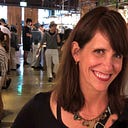Parents Continue to Buy Kids Sugary Fruit Drinks, Despite Health Risks
Part of the problem is marketing
Despite what we know about how bad sugary fruit drinks are for kids’ health, they still make up a majority of children’s drink sales, according to a new report.
Fruit drinks and flavored waters that contain added sugars and diet sweeteners make up a whopping 62 percent of the $2.2 billion in children’s drink sales for 2018, according to Children’s Drink FACTS 2019, the most recent report from the Rudd Center for Food Policy & Obesity at the University of Connecticut.
The report, funded by Robert Wood Johnson Foundation, found that drinks with no added sweeteners, like 100 percent juice or water blends, represent only 38 percent of sales.
Earlier this year, the American Academy of Pediatrics and the American Heart Association issued a joint policy statement on why children and teens urgently need to reduce sugary drink consumption: Beverages with added sugars are associated with cardiovascular disease, type 2 diabetes, hypertension, dental decay, and all-cause mortality.
Marketing is a big part of the problem, according to the study, because parents and kids have trouble differentiating between drinks with added sugar and those without.
“Beverage companies have said they want to be part of the solution to childhood obesity, but they continue to market sugar-sweetened children’s drinks directly to young children on TV and through packages designed to get their attention in the store,” Jennifer L. Harris, an author of the study and the Rudd Center’s director of marketing, said in a press release.
Researchers also raised concerns about targeted advertising to Latinx and black families, noting that two beverages marketed toward children — Capri Sun Juice Drink and Sunny D fruit drinks — each dropped about a quarter of their TV ad budget on Spanish-language TV.
Researchers found that most portion sizes are too big, delivering more than the maximum daily amount of juice for toddlers and in some cases pre-schoolers. In many cases, the sugar content and calories contained more than one-half of a child’s recommended maximum daily intake. And although experts don’t recommend low-calorie sweeteners for kids under 14, they’re used in products marketed to children.
Kids’ drinks made up $2.2 billion of the $22.9 billion in sales of juice, fruit drink, and water products for 2018. The report found that three companies — Kraft Heinz, CocaCola, and Harvest Hill Beverages — and four of 22 children’s
brands — Kool-Aid, Capri Sun, Minute Maid Lemonade, and
Sunny D — advertised sweetened children’s drinks.
Across media, children’s 100 percent juice and juice-water blends spent more on advertising than fruit drinks and flavored water with added sweeteners: $34.4 million vs. $20.7 million. That said, kids’ drinks with sweeteners spent more for TV ads than 100 percent juice-water blends: $18.5 million vs. $13.6 million.
Maria Romo-Palafox, an author of the study and an assistant professor of Nutrition and Dietetics at Saint Louis University, noted that the labeling of these beverages can be confusing for consumers.
“The fronts of the packages make children’s drinks look healthy, but there’s no way to know which ones have added sugars or low-calorie sweeteners reading the front,” she said in the press release. “You have to read the nutrition facts panel on the back and you have to know the names of low-calorie sweeteners, such as acesulfame potassium and sucralose, to realize they are in the product.
“You shouldn’t have to be a nutritionist to figure out whether or not a product is healthy for your child.”
Melissa McCart is an editor for Heated with Mark Bittman.

